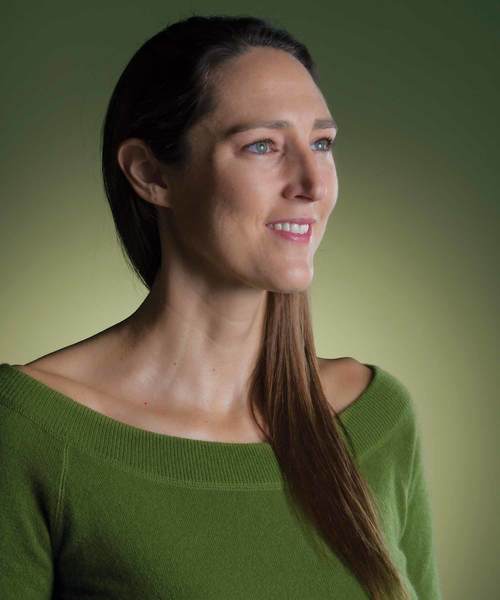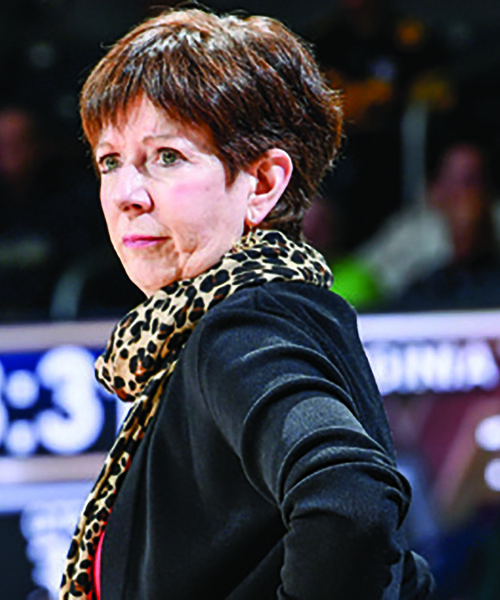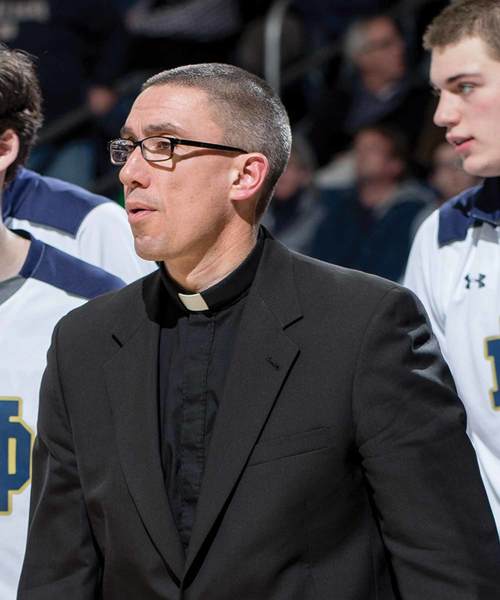
Ruth Riley
From pro athlete to humanitarian
Ruth Riley, owner of an NCAA national championship, two WNBA titles and an Olympic gold medal, knows what it’s like to stand out in a crowd.
So, after retiring from her phenomenal professional playing career last summer, the former Irish women’s basketball star is making it her life’s work to tell others who walk in shoes similar to the ones she wore as a child to understand that’s OK.
Growing up in Macy, Indiana, a tiny burg of less than 250 people about 60 miles south of the University of Notre Dame campus, Riley didn’t realize her family was poor. Mom Sharon provided for her three children—Rachel, Ruth and Jake—by waitressing, working in factories and styling hair in their home. Although making ends meet often was difficult, Sharon, as a single mom, made sure her children were unconditionally loved and taught to work as hard as they could at whatever task lay before them, to willingly help others in need and to express gratitude for all they had been given.
The children qualified for the free and reduced lunch program in their school, and that’s when Riley began to think she was different.
“There’s such a negative stigma around these resources and that often prevents children from using services that are readily available to help them,” Riley said. “But I was a beneficiary of those programs so I know firsthand how important they are and how they can make a difference in children’s lives. No child has to go hungry.”
And that’s why she cares so deeply about her involvement in Share Our Strength’s No Kid Hungry campaign, a bold initiative that plans to eradicate child hunger in the United States where one in five children don’t get enough to eat.
Riley, now a member of the organization’s national council, joined forces with No Kid Hungry in 2012. Its message resonated with Riley and, after making sure her family approved of her publicly sharing their experience, she made it her mission to help reduce that stigma of accepting help from these sorts of programs.
“I identified with what the organization was advocating,” Riley said. “Children and their parents should not be afraid to accept this help.”
Riley also wants Americans to understand that hunger-related issues are in no way exclusive to third-world countries.
“We need to be comfortable acknowledging that our neighbor’s children are quite possibly going hungry and do something to rectify that.”
But that was not the first, nor the last, time Riley has used her high-profile sports platform to make a difference. Adding the fight to end child hunger to her list of causes was just another example of the 2001 Notre Dame psychology grad’s inability to say “no” when someone or some nonprofit organization asks for her help.
“So much of my life is not something I could have planned, but rather it has come to me, and I’ve had such incredible support from so many people,” Riley said. “I like to think I go in whatever direction God leads me. Good intentions do not equal good works. I want to put actions behind those intentions.”
Riley, the 2001 Naismith Award winner, a two-time All-American and a two-time CoSIDA Academic All-American, first realized the connection factor of sports when she played for the Irish. She was a fan favorite, and both little boys and little girls, as well as lots of adults, looked up to her.
“When I was a junior and a senior, we had informal autograph sessions after our home games,” Riley said. “I always signed every single autograph because those fans were so supportive of me. I began to realize that I could be an influence for good.
“Notre Dame opened my eyes to the diversity of the world and encouraged the same values I grew up with. I was inspired by so many around me.”
Early in her professional career, Riley, a first-round draft choice of the Miami Sol, became active in WNBA Cares, a league-sponsored effort to support organizations and causes that “improve the quality of life for all people with a special emphasis on programs that inspire youth and families worldwide, promote health and wellness and education.” Most of her early work and appearances were in the communities in which she played—Miami (2001–02) and Detroit (2003–06).
But in 2006 her role with the NBA expanded globally and she visited Africa as a league representative. She made her first trip—by herself—to attend a Global AIDS awareness event in Nairobi, the capital city of Kenya. She met with health and government officials as well as business leaders and toured AIDS clinics and villages.
“What I learned about AIDS paralyzed me,” Riley said. “These women basically had no rights. It was very hard for me since I was raised by an incredibly strong single mother. Here were these women fighting to save their lives and the lives of their children. I looked in their eyes and they reminded me of my mom. The trip truly enlightened me.”
That visit spurred her involvement with TRIAD Trust, a Boston-based organization that focuses on prevention and education to help reduce the AIDS epidemic in Africa. TRIAD’s philosophy involves training local leaders to create and sustain HIV and life skills education programs through arts, sports and technology for young people who are considered at-risk.
In 2007 Riley found herself back in Africa again—this time in Nigeria and Angola—as an ambassador for both the United Nations Foundation and Nothing But Nets.
Seven years ago, malaria killed a child under age 5 every 30 seconds and endangered 25 million pregnant women a year. Economically the disease accounted for up to 40 percent of public health expenditures. But it’s a disease that’s relatively easy to prevent. In 2006 Sports Illustrated columnist Rick Reilly sparked a national movement with an emotional piece that told readers a donation of just $10 covered the purchase and distribution of a net that, properly secured over a child’s bed, would save his or her life. Since that column, more than $45 million has been raised through Nothing But Nets’ partnership with the U.N. and the NBA, and now the malaria death rate has been reduced to one child under the age of 5 every 60 seconds, a figure that is still too high.
“Women would walk with their children for over a day from their village to a clinic just to get treated,” Riley said. “These women often had no hope. One woman I met had a child under one arm and a new net in the other. She had recently lost one child to malaria, but that net gave her hope that her youngest would now have chance to live. She was like my mother—she just wanted the best for her child.”
Riley continues to serve as a spokesperson for Nothing But Nets and has met with several members of Congress on its behalf.
But her service initiatives don’t end there either.
Riley, who played professionally during the WNBA’s offseason in Spain, Poland and Greece, has represented her country as an envoy for the U.S. Department of State on several sports diplomacy trips to the Republic of Congo, the Democratic Republic of Congo (formerly Zaire), Spain and Morocco. Believing that sports can transcend linguistic and socio-economic differences, the state department helps sponsor clinics and camps in developing countries and economically depressed areas.
“The local embassies sponsor grassroots programs in an effort to make positive and sustainable change,” Riley said. “There are English clubs, debate clubs, basketball clinics. Sports and music provide powerful platforms to educate and unite people.”
In addition, she visited Nigeria, Angola and Mali with the U.N. Foundation. Her travel log also includes entries from Kenya, South Africa, Namibia and Swaziland. In fact, Riley estimates she has made at least two annual trips to Africa since that initial visit in 2006.
Riley’s work in Africa steered her toward her most ambitious project to date—Inspire Transformation, a non-government organization designed to create community-based initiatives to support and sustain women and children and foster positive change. She founded the program with Sarah Kate Noftsinger, a former soccer player at Wake Forest University and assistant soccer coach at Stanford, and Katherine Wald, a licensed psychotherapist in private practice in Miami.
“Whether it is poverty, hunger, disease, or education, the key to solving most of the Millennium Development Goals set forth by the U.N. is to focus on teenage girls,” Riley said. “Women need to be educated and empowered. They are the ones who effectively use microfinance opportunities to reinvest back in their community. They are the ones who are responsible for the health of their communities.”
Inspire Transformation has two flagships organizations, located in the Nkomazi region of Mpumalanga, South Africa.
The Masisukumeni Women’s Crisis Centre in Tonga, South Africa, offers professional resources and training to local leaders so they can treat and prevent domestic violence, rape and sex trafficking. The centre’s mission is to “eradicate violence and discrimination against women and children and prevent HIV/AIDS by providing counseling, information, education and paralegal services to survivors of gender-based violence and to the wider community.”
The Nkomazi Sports Club, located in Kamhlushwa, South Africa, hopes to change lives by providing opportunities through sports. Creating youth sports teams and leagues offers a safe environment and stage for children to learn life skills and nurture their leadership capabilities.
“By working with local leaders, we can create and sustain lasting change,” Riley said. “Education and global health for women and children are so connected. Life there is just so different from what we know. My mom empowered me and encouraged me to dream big. That’s what I want these young girls and women to do.”
While in the WNBA, Riley served eight years as vice president of the players’ union, an experience that honed her leadership skills, expanded her circle of opportunities and planted the seed for life after basketball.
“Working with the union taught me how to think beyond myself and negotiate for a collective body. I had to negotiate collective bargaining agreements that would serve the best interest of all our players and continue to grow our game.”
That led her back to campus in August as a member of Notre Dame’s latest executive master of business administration class, a 21-month program designed for working professionals that’s ranked among the top 15 in the world by The Economist and Bloomberg Businessweek.
“I always knew I would go back to school,” said Riley, who was inducted into the CoSIDA Academic All-America Hall of Fame in 2012. “I thought about law or a master’s in nonprofits, but this program fits perfectly with my schedule, my experience and what I want to do. So far, it’s been great, and I’ve met some amazing people. I’m not sure where this will eventually lead me, but I know it will help with ensuring the success of Inspire Transformation.”
Riley, who admits she often stretches herself too thin, is learning that to be truly effective, she needs to prioritize her time and focus on the areas and causes most suited to her interests and talents.
Yet, she shows no signs of slowing down or cutting back her efforts to help.
“I want to encourage people to give back, to do good. We all have our own unique area of influence. You don’t have to a professional athlete to have a platform. We all have the same amount of time that we can use; it is how we choose to spend it that will reflect the legacy we leave behind.”
Since she’s traveled extensively in Europe, Asia and Africa, she’s now setting her sights on South America.
“I’ve never been there,” Riley said. “I think it’s such a different culture. I want to learn more about that.”
The Junior Chamber International, a membership-based nonprofit organization of 18- to 40-year-olds dedicated to seeking positive change in their communities, recently tabbed Riley as one of 10 recipients of its Outstanding Young Persons of the World honor for her humanitarian and voluntary leadership. She received the award in November in Leipzig, Germany.
“I’m very humbled by the award,” Riley said. “But it seems a little strange to be getting an award just for helping people.”
Once again, Riley is standing out in a crowd—and while not always comfortable with the spotlight, she knows how to use that platform to make the world a better place for those who dream big and work hard, just like she did.

